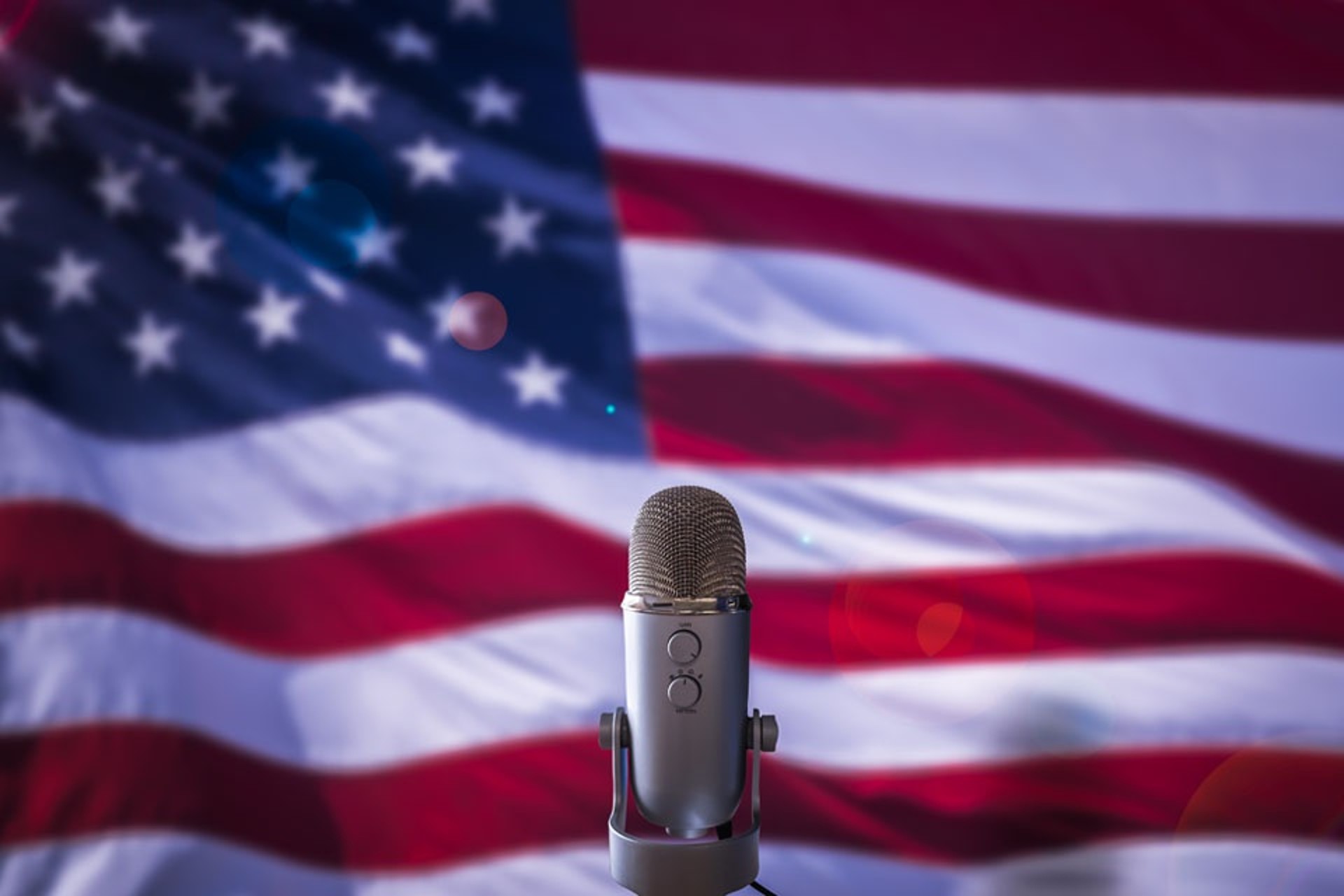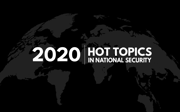Memo Published May 19, 2020 · 15 minute read
Talking Points for the Top National Security Issues of 2020
Mieke Eoyang, Allison Peters, Michael Garcia, Anisha Hindocha, & Pat Shilo

In 2020, candidates and elected officials will face questions on national security and foreign policy issues.
In this memo, we provide short talking points on these issues that acknowledge the concerns of Americans, critique current approaches and policies, and present a vision for the future: 1. Global Health Security, 2. China & COVID-19, 3. China Trade War, 4. Russia, 5. Terrorism, 6. Domestic Extremism, 7. Iran, 8. Election Security, 9. Saudi Arabia & Yemen, 10. Syria, 11. Alliances, 12. North Korea, 13. Cyberthreats, 14. Venezuela, 15. Afghanistan, 16. Forever War, 17. Border Security, 18. Defense Spending, 19. Impeachment, 20. Climate Change, 21. Corruption
1. Global Health Security
Q: How should the US prepare for global health crises such as pandemics moving forward?
With new leadership, we can ensure our country is better prepared to fight pandemics and other global health crises. That includes capping everyone’s health costs and ensuring everyone has coverage. We should restore funding to pandemic prevention and detection programs. And we will work to boost international cooperation on global health. We’re all in this together, and attacking other countries is a distraction from solving the problem. Diseases know no borders—and being healthy is at the core of our national security.
The COVID-19 outbreak is the most consequential event of our lives. It has disrupted lives, the economy, supply chains, education, and travel. The Administration’s catastrophic mismanagement of the pandemic from the start has made a very bad situation worse, making it harder to fight the pandemic and delaying efforts to safely reopen the economy.
2. China’s COVID-19 Response
Q: What role did China play in the COVID-19 outbreak?
The Chinese government stifled the origins of this pandemic and has been putting out misinformation. We need an independent, impartial international investigation into the beginnings of this crisis and the origin of the virus without Chinese government stonewalling. And we will hold them accountable for their role in this.
But the most urgent thing is to protect the American people and safely re-open the American economy. That responsibility falls squarely on President Trump—and his mismanagement has been catastrophic. He ignored the warnings of experts, and squandered the time to prepare. Shortages of protective equipment, tests, and medical equipment are costing Americans their lives. He and the Republicans are putting ideology ahead of solving this crisis. We need new leadership committed to the health and welfare of all Americans.
3. China Trade War
Q: The US and China engaged in a two-year trade war that had real economic impacts to the United States. Should the US have launched this trade war and what should the path forward be now for the United States in light of COVID-19?
China must be held accountable for its unfair trade practices. China’s use of discrimination, opacity, and arbitrary and unpredictable business regulations keeps its companies competitive at home—and China’s trade rules reflect and promote this approach abroad.
President Trump has promised his tariffs would make China pay. But Americans have to pay for those tariffs in the form of higher prices on everything affected. Under Trump’s trade war, China has closed its markets to US farmers, while American consumers pay more. Trump promised to bring manufacturing jobs back home, but instead it’s Taiwan, Mexico, and Vietnam that are seeing the benefit.
All of this is made worse by this pandemic and Trump had to backtrack, suspending payments on tariffs for 90 days due to COVID-19. But we need to do more by lifting the tariffs on steel, aluminum, and other goods, especially medical supplies and essential goods and services.
4. Russia
Q: What should we do about Russia?
Russia is not our friend. They want us separated from our allies. They want to sow division and chaos. They harbor cybercriminals who steal from Americans. Putin’s Russia has always feared the example that American democracy and leadership sets in the world. But Trump refused to stand up to Putin and for the United States, lifting the sanctions Congress imposed.
First, we must make sure America recovers. We will need to make sure Americans are healthy and can safely re-open the economy. We need to ensure American elections are for Americans, not for Russian trolls. We need new leadership to rebuild our alliances. Once America is back on her feet, we can hold Russia accountable for its election interference that brought us the worst President in American history.
5. Terrorism
Q: How do we protect the nation against terrorists?
We take terrorism very seriously. Despite Trump’s claims, terrorist groups like ISIS are still active around the globe and will pose a threat, and we cannot abandon our allies who fight them. But since 9/11, we have seen tremendous improvement in our government’s ability to deal with terrorism. To continue to keep Americans safe from terrorism, we need steady partnerships with our friends.
6. Domestic Extremism
Q: The United States has seen a wave of attacks perpetrated by violent extremist Americans, particularly those that are racially motivated, that some argue should be labeled domestic terrorism. What should we do to combat this threat to Americans?
Sadly, under Trump, right-wing violent extremism in this country is now a greater threat than international terrorism, according to the FBI. And yet, the President has referred to these groups as “very fine people.” But hate has no place in America. We need to treat people who commit or threaten violence as the criminals they are.
7. Iran
Q: Tensions between the United States and Iran continue to remain high after America’s killing of top Iranian General Qasem Soleimani. What steps should now be taken in regard to America’s policy toward Iran?
Trump’s strike on a senior Iranian leader, risking an all-out war, was reckless and irresponsible. Yes, Soleimani had blood on his hands, and was plotting more violence. But wise Presidents seek to reduce Iran’s dangers without risking the lives of American servicemembers in yet another war in the Middle East.
So now the next President will have to pick up the pieces and try to reassemble an international coalition to make clear to Iran they can have an economy or nuclear weapons but not both. We need to renegotiate an agreement that reimposes the constraints on Iran’s nuclear program as we work to address their other malign activity.
8. Election Security
Q: How do we protect our elections so they are free from foreign meddling?
We know the Russians are coming back in 2020. They backed Donald Trump before because they saw him as the best way to weaken America from within. Sadly, they were right. But now we must do what we can to prevent them from taking away the ability of the American people to choose an American leader. That means working with tech companies and media to combat misinformation online. It means working with state and local election officials to ensure that we have secure, verifiable election systems. And it means ensuring that every eligible American gets out to vote and makes their choice clear.
9. Saudi Arabia (and its involvement in Yemen)
Q: Congress has passed several bipartisan bills to make changes the US relationship with Saudi Arabia after its government was accused of murdering a Washington Post journalist and causing a humanitarian crisis in Yemen, but President Trump has vetoed them. How should the United States approach its relationship to Saudi Arabia moving forward?
Unlike President Trump, Americans don’t want to give a pass to countries that commit horrific abuses against innocent people. That’s why they want a change in our relationship with Saudi Arabia. We must hold the Saudi government accountable for stoking a civil war Yemen that cost over a hundred thousand lives. Further, they must be held to account for the brutal murder of journalist and US resident Jamal Khashoggi.
10. Syria
Q: What should US policy in Syria be?
We need a way to end America’s involvement in the endless war in Syria while preventing it from becoming a safe haven for terrorists like ISIS to plan and launch attacks on the US. But President Trump’s abrupt withdrawal put the gains we have made against ISIS at risk. He abandoned our Kurdish allies in Syria who were the most effective fighting force against ISIS, leaving them vulnerable to Turkish attacks. As a result, Russia has become stronger in Syria.
11. Allies and Alliances
Q: President Trump has sharply criticized and imposed tariffs on some of America’s allies and alliances. And he has proposed steep cuts to global organizations like the United Nations. How should the United States approach its relationship with these countries and organizations moving forward?
The COVID-19 crisis shows that America cannot solve many of its problems alone. Threats that are bigger than one nation need the cooperation of many nations. But President Trump turned America’s friendships upside down, alienating democratic allies like Germany and Canada while embracing dictators and autocrats like Russia and North Korea and undermining the international tools and organizations the US established to fight global threats. We’ll need new leadership that works with, not insults, our friends and allies, while holding accountable our adversaries.
12. North Korea
Q: President Trump held two summits with North Korean Leader Kim Jong-un on the country’s nuclear weapons program, but the country has continued to conduct ballistic missile tests despite these summits. How should the United States be dealing with North Korea moving forward?
North Korea’s nuclear weapons are a very real threat to the US. But the President’s photo-op with the brutal dictator, Kim Jong-un, did nothing to deliver real, measurable, verifiable reductions to their nuclear arsenals. Now, the North Korean negotiators won’t return our calls and their government has resumed tests of their ballistic missiles. We need tough negotiators who know how to draft a real agreement, not a press release.
13. Cyber Threats
Q: As more and more Americans move their daily lives to online, what can the US government do to combat the cyber threats that the country faces?
Amid the COVID-19 pandemic, the US has seen a rising cybercrime wave. Reports of cybercrimes have tripled or quadrupled since the pandemic began, to 3,000 and 4,000 per day. Yet the cybercriminals behind these attacks largely operate with little fear of getting caught—an estimated only 3 in 1,000 reported cyber incidents ever result in an arrest. We need to boost investment in law enforcement efforts against cybercriminals, and build partnerships with our international allies and the private sector in order to protect Americans online.
14. Venezuela
Q: The United States recognized Juan Guaido in 2019 as the Interim President of Venezuela and called on President Nicolas Maduro to step down. However, Maduro still remains in power. What steps should the United States be taking now in regards to Venezuela?
The situation in Venezuela is a disaster, causing a flow of refugees throughout the Western Hemisphere. COVID-19 could make the destabilization worse. The Maduro regime must stop blocking vital humanitarian assistance from getting into the country. We and our regional allies want to see elections, so the Venezuelan people can decide who governs them. No one should seize or hold power through military force.
15. Afghanistan
Q: The United States signed a deal with the Taliban in February 2020 that commits to the removal of American troops if the Taliban takes certain steps. What should the United States’ involvement in Afghanistan look like after this deal?
It’s time for the long war in Afghanistan to end and our troops to come home. A peace deal between the United States and the Taliban is a positive first step, but it’s unclear it will end the violence, be accepted by the Afghan government, or prevent the country from becoming a terrorist safe haven once again. The US, its allies, and partners must hold the Taliban to its commitments, while ensuring direct negotiations between the Taliban and the Afghan government that will finally bring an end to the conflict.
16. Forever War
Q: The Post 9/11 Authorization of the Use of Military Force (AUMF) has been used to justify deploying American troops around the globe to fight terrorism. Should the United States repeal this authorization to scale back this endless war?
In 2001, Congress passed an authorization for the President to use force against the terrorist groups that attacked us on 9/11. For nearly 20 years, it has been used as the legal basis to fight terrorist groups around the world, some with no connection to those attacks. We must re-evaluate our counterterrorism strategy, determine which groups still pose a direct threat to America, and replace that authorization with something that accurately reflects the threat.
17. Border Security
Q: President Trump has said that migrants arriving at the US-Mexico border are taking advantage of America’s laws and weak border security to come into the United States. From building the border wall to increasing immigration enforcement, he has made border security central to his presidency, which many Democrats have opposed. Should stronger border security measures be put in place?
President Trump claimed the US border is overwhelmed. While we face challenges at the southern border, we need to meet those challenges with proven and sensible solutions. Over the past 10 years, we spent over $150 billion dollars, deployed 20,000 border agents, and apprehended 4.4 million people trying to illegally enter the country. We don’t have open borders. The Trump Administration’s draconian policies range from tearing children from their parents to building a wall. They aren’t the answer. We need a bipartisan plan to strengthen border security and create an earned pathway to citizenship for undocumented immigrants if they keep out of trouble, work hard, learn English, and pay taxes.
18. Defense Spending
Q: The COVID-19 pandemic has led to calls by some policymakers for reductions in US defense spending to boost investments in other areas. How much should the United States be spending on defense?
The COVID-19 pandemic has demonstrated many of the greatest threats our nation faces cannot be fought by the military. This crisis calls for a serious reevaluation of our military infrastructure. While the US will continue to have the most advanced, best-trained military in the world, we need to be able to address the threats of today and tomorrow, not fight our grandparents’ wars. As we do all this, we should be investing in the tools we need to keep Americans protected from 21st century threats—from pandemics, to cybercrime, to climate change.
19. Impeachment
Q: President Trump was impeached by the House of Representatives but subsequently acquitted by the Senate in February. Was impeaching the President an appropriate action by the House and should he have been removed from office by the Senate?
What President Trump did is not in dispute: he withheld desperately needed military aid to pressure the government of Ukraine to manufacture a baseless investigation in hopes of harming his most feared-rival and helping in his reelection. He directly admitted to it. Many public servants and military officers—several hand-picked by the President—were witnesses to his actions and registered their alarm. What President Trump did is egregious and in clear violation of our Constitution, which bars the President from using the powers of government for personal benefit. We are a country of laws and the House could not just stand by and let the President get away with violating his oath to the Constitution. But instead of standing up for our country, Republican Senators overwhelmingly voted to acquit the President without even holding a trial with witnesses and with minimal questioning. The American people deserved a fair trial with witnesses called by both sides. They will now get a say in November.
20. Climate Change
Q: Will climate change affect our national security and, if so, what should we do about it?
Climate change is one of the most difficult challenges we face. We already see its effects in more damaging floods in the Plains, wildfires to the West, and hurricanes in the East. The Defense Department has made clear that climate change only multiplies the risks facing our nation and our military bases abroad. It’s already contributing to the displacement of millions of people around the world who face worsening droughts and natural disasters, increasing the risk of conflict.
President Trump has ceded America’s global leadership on climate, rolled back commonsense efforts to cut emissions, and even tried to strangle our lucrative clean energy industries. He thinks if he just calls it a hoax or hides from the problem, climate change will go away. He’s wrong. If America stands idle, climate change will make us weaker and divert trillions of dollars from our economy. We need to resume cooperation with our allies and use our influence to make sure all countries are doing their part to maintain a safe and stable climate. We can help eliminate this threat and secure new opportunities for American industries and workers in a low-carbon economy – but only if we show up at the negotiating table and make the right investments here at home.
21. Trump Corruption
Q: In addition to the impeachment investigation, the House has opened several other investigations into President Trump’s business dealings. Should Congress be pursuing these investigations?
The American public deserves to know if their hard-earned taxpayer dollars are being used to personally enrich the President, his family, and others in his orbit. Time and time again, we have seen President Trump put his personal interests above the interest of the American people, with some estimates that he has upward of 3,000 conflicts of interest from refusing to divest from his businesses. Foreign governments have awarded his businesses 65 trademarks while he has been in office, and special interest groups consistently use Trump properties as venues for their events. It is the duty of Congress to investigate possible corruption by the President, but what is important now is we look ahead and make sure all Americans have the ability to have their say at the ballot box in November through safe, secure, and accessible elections.





